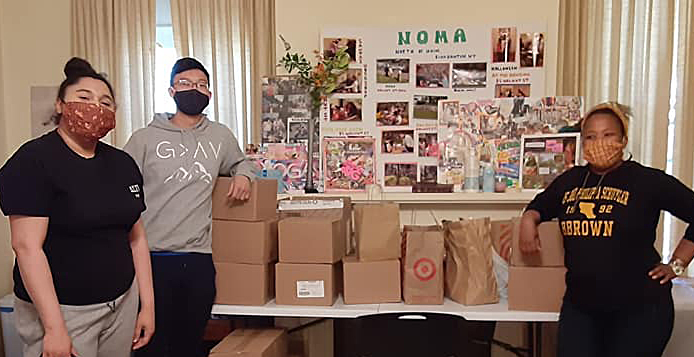By Andrea Garthwaite
April 27, 2021

The Binghamton University Kappa Lambda chapter of the Delta Sigma Pi business fraternity has found ways to continue serving as an active part of the community this semester, despite COVID-19. The organization recently joined with the Binghamton InterVarsity Christian Fellowship to help the North of Main (NoMa) Community Center create a personal hygiene pantry for members of the community.
Delta Sigma Pi (DSP) is Binghamton’s oldest and largest professional fraternity on campus. While the co-ed fraternity is mostly focused on business-related activities and connections, another large component of their organization is helping out in the community.
This semester, DSP has been working in conjunction with the community center in NoMa, a neighborhood north of Main Street in Binghamton’s west side. According to NoMa Community Center Coordinator, Brandy Brown, many residents come in asking for personal hygiene products. She decided to create this pantry to help fulfill that need.
Kayla Altman, the vice president of community service of DSP, contacted Brown last year with interest in partnering with NoMa. Brown mentioned the idea for the pantry to Altman, and DSP took the initiative to partner with the InterVarsity Christian Fellowship collect supplies.
Together, the two organizations donated numerous hygiene products such as masks, hand sanitizer, deodorant, toothpaste, soap and sanitary products.
Richard Chow, the vice president of marketing of DSP and small group leader of the InterVarsity Christian Fellowship, was very excited to work on this collaboration.
“I was really glad that two organizations that I am super involved in were able to come together to collect supplies for NoMa,” he said. “Members from both groups chipped in, and we were able to make a sizable donation. Seeing the surprise on their faces when we came to drop off all of the supplies made it all worth it.”
Brown considers this project a huge success. “The personal hygiene pantry is making a difference by reducing personal hygiene insecurity and promoting healthy habits within the community,” she said.
Brown said she recalls different time periods of her life in which she could not afford certain personal hygiene products. “I’m hoping to help eliminate that feeling for others.”